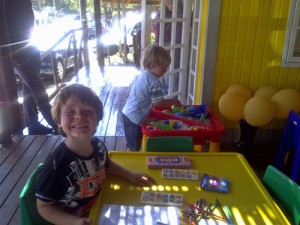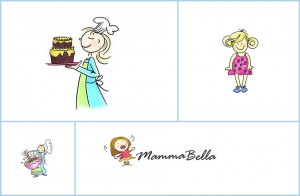Do you want your child to develop a strong, agile, and healthy body? Do you wish your child could master the skills needed to excel at a variety of sports? I am sure all parents want their children to experience success and to have fun while they develop fine and gross-motor movements as well as good balance, co-ordination and rhythm. (Unfortunately many sports programmes for young children target one specific set of skills and are competitive and challenging in a way that could warp a child’s self-esteem or emotional development.)
Do you want to raise a creative child? One who can come up with amazing ideas, amuse himself, solve problems and enjoy the magical side of childhood? Of course you do! The problem is that these days it seems like every toy and every children’s programme focuses on education, not creativity.
The good news is that you can foster both the creative spark and the optimum physical development! Start by tweaking your attitude: the strict rules of rugby are great for the Springboks, and statements such as, “No, no, the sun should be yellow,” can either hinder a child’s willingness to participate in sport or halt creative thinking. Encourage participation and creativity by being open-minded and non-judgmental.
Participation in physical activities that are fun and non-threatening and also being involved with stimulating creative activities lets children develop their skills in a way that works for them. Physical and intellectual development are often closely intertwined. Even 6 year-olds can do basic multiplication – they often figure it out on their own through playing games.
Here are ways to spark both the physical and intellectual development of your child:
1. Free play Open up some time for free play – just relax and let your children play as children. Avoid complicated toys; rather, opt for things such as building blocks, dough, a ball, a hoop, a Frisbee, crayons and paper or just kitchen utensils. Free play is about letting children solve their own problems, as opposed to showing them what the answer is.
2. Music – music is fun! Children respond immediately to music. Encourage them to sing, dance and try their hand at various instruments. Dancing or moving to music is great exercise too!
3. Story Telling Every child loves books, and every parent loves a child who reads: they’ll do well in school. But books and stories are also a great source of creative fun. When children learn they have the ability to take stories off the page, they feel empowered to let their own amazing ideas take over. Children of almost any age have the ability to compose their own stories; they just need some encouragement from you.
4. Drawing, Colouring and Crafts Isn’t doing crafts just creative by nature? Not always. Choose hands-on projects that include a component that your child contributes. Sometimes that’s as basic as choosing the colours they wish (No, the sky does not have to be blue!), or doing a project where you don’t have to follow the instructions word-for-word to get a fun result.
5. Outdoor games: With basic equipment and fine weather, your child will enjoy simple physical games! Use a hula hoop, a Frisbee, a skipping rope, a ball balanced on an empty coffee tin to aim at and hit with a pool noodle for a bat. Create a target and let him throw balls of different sizes, shapes and colours. Set up a series of 5 small objects on the lawn about 1,5 meters apart – in a straight line – and a target or goal at the end. Give your child a ball (preferably a small soccer ball), and ask him to control the ball with his feet only, weaving in and out of the line of objects. Once he reaches the last object, he must take aim and kick the ball into the goal.
Every child possesses unique talents and unlimited potential. It is up to us – parents and educators – to identify, nurture and develop those latent talents. However, with such busy lifestyles and demanding careers, parents often do not have the energy, the expertise or the time!
“Beyond Potential” is a group of ex-teachers (and present parents) who understand too well the rigors of modern parenting. They have created an innovative programme with the specific aim to help parents and teachers in their challenging task – to stimulate a child’s imagination & creativity, enhance perceptual, physical and cognitive skills – while the child experiences fun, excitement and discovery!
The Programme is for children aged 2 – 10, and consists of:
- “Buzzi Brains” = Educational Games, Stories and Discussion, Arts and Crafts, Fun, mind-stretching Activities and Brain Gym.
- “Buzzi Bodies” = All the skills needed to excel at sport in Primary school. (Soccer, Cricket, Tennis, Rugby, Hockey, Netball, Golf, Rhythmic gymnastics and Athletics.) Develops gross & fine motor movement, balance, locomotion, spatial relationships, co-ordination, rhythm & timing, strength and flexibility.
Disclaimer: The above article was supplied to Super Mom Blog for publication by Beyond Potential.















